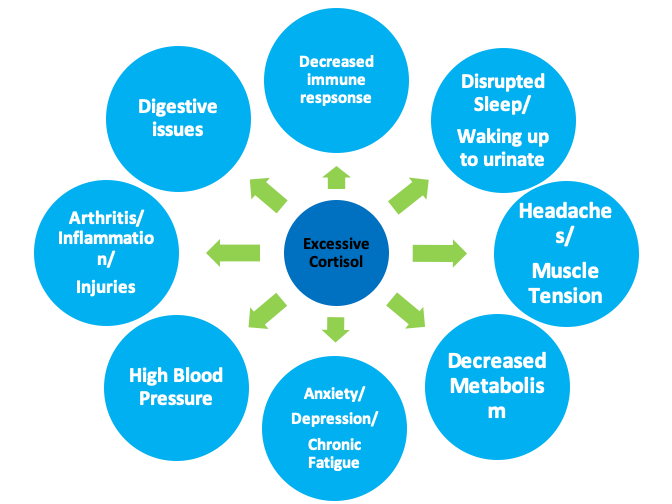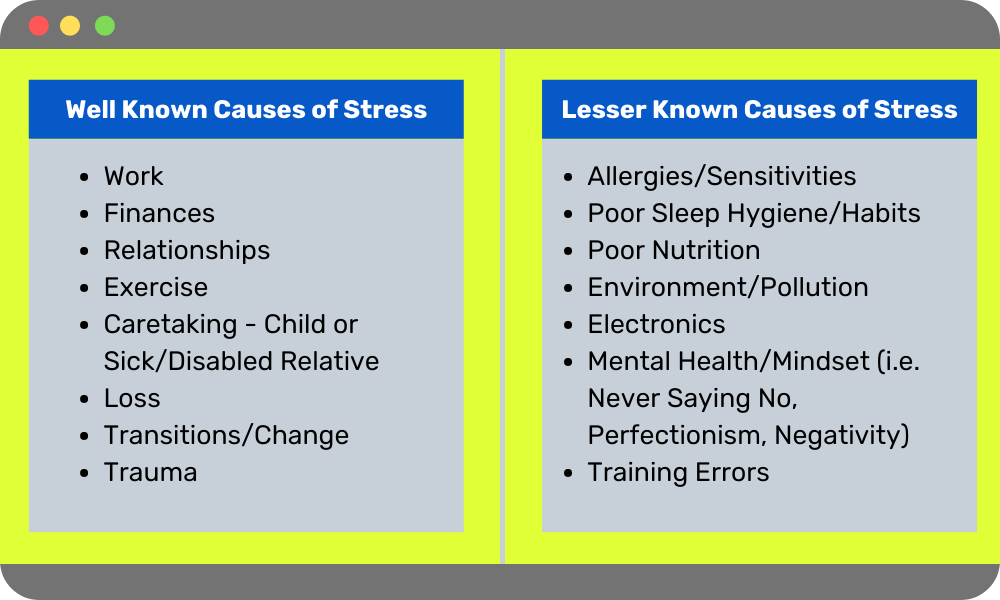As runners, we would all like to believe that our lives can be filled with effortless runs and great performances, but the truth is that running is really hard sometimes (a lot of the time). Even if you’re not a runner, it can be hard to feel good all the time and I think we can all agree that we would like to feel good as often as possible. Achieving this goal can be challenging when faced with busy schedules, work and family demands, awful news stories, etc. On top of this, we want to find time for training or exercising, which is supposed to help us feel good!
Whether our stress is good (a run or workout routine) or bad (work, finances), our body’s response is to release a hormone called cortisol. Cortisol is vital to our survival and is released by the adrenal glands, which sit right above the kidneys. However, too much stress for too long can create an equal environment of too much cortisol in our systems for too long. This can lead to a host of problems (see figure below).

Eventually, though not very common, our bodies can reach a point where we can no longer respond to stress. You can think of the adrenal glands as a battery that can no longer be charged and no longer produce cortisol. This state is called adrenal fatigue, and it can take a lot of work by you and a multidisciplinary health team to help you recover from this. Even if you are not in a state of adrenal fatigue, it is still important to be aware that you may be on a path toward it or be in a state of chronic stress. You may be reading this because you are currently in physical therapy for an injury. You want to make sure your body is ready to heal itself. A state of chronic stress may limit your body’s self-healing capabilities. In fact, the stress itself may be contributing to the injury to begin with.
Knowing this, there are a lot of things we can do to help maximize our training and limit our stress. At Omega Project, we frequently help educate clients on everything from training plans, nutrition, sleep health, mental health, and breathing. Typically, if you are seeing us for an injury, there is more to it, and we want to ensure we address every aspect of what will prime your body to heal itself. A holistic approach to your treatment will help get you back to running quickly and keep you on the road.
Know Your Stressors
To start helping yourself discover your potential for healing and performance, you must first become aware of your stressors. Listed below are some of the more well-known causes of stress and the lesser-known causes of stress. When you become aware of your stressors, you can more easily regulate your training and/or daily activity and avoid a state of chronic stress or over-training. For example, you may become aware that in the Spring, when allergens are high and you are an unlucky victim, you are going to be a little more tired. Instead of ending up sick year after year, you may consider modifying your training during this time of year or making sure you get more sleep and/or manage other aspects of stress.

Know When to Say No
Knowing your stressors doesn’t always make it easy to decide what to do with your training on any given day. It is very easy to give yourself a guilt trip about “quitting” or not showing up. Therefore, the second step is to make a list of three factors that we can check in with whenever we have a decision to make about our training and other obligations:
- Define your values and priorities (i.e., spend time with family, run in the Olympics)
- Define your why (i.e., I am running this race to get a PR, I am running this race to prove to myself I can finish something, I am running this race because it helps me stay fit and I want to be healthy for a long time)
- Define your goals – Your short-term and long-term goals should align with each other, your values, and your why.
This might look like a situation in which you have to decide whether or not you will wake up at 5 AM to run. You didn’t sleep well, and work was really stressful the day before. You know you want to be available for your kids later in the day and you’re unsure if you can run, work, and “show up” for them. If you’re a professional runner, well, running is your job and a priority. You better get up and run because you’re getting paid to do it. If you’re not a professional runner, and family is on your list of values and priorities, you may decide not to run. The hope is that you will feel good about this decision, having checked in on your list of values/priorities, your why, and your goals.
Know Yourself
In order to take the two steps above, it is vital that you be honest with yourself and check in often. We also recommend you ask yourself these two questions:
- Am I running FROM my mental health or FOR my mental health?
- Do I have things outside of running that bring me joy and/or help me manage stress?
Depending on your honest answers to these questions, you may want to consider learning more about your mindset and mental health and other ways to manage stress. A counselor is not only someone who can help with mental health disorders such as depression and anxiety but also help you answer these questions and find solutions if you don’t like the answer. They can help with things like time management, mindset, goal writing, defining your why, and more. Treat your mental health like you would a physical injury or illness.
In summary, consider your lifestyle, stressors, and goals and priorities when making your training plan. Stay flexible from day to day. Running, working out, and stress only serve to break you down. This is necessary to a certain extent, but it is in the recovery that we make the gains. The gains are what make us faster and healthier.
Omega Project Can Help!
- Get bodywork to release the diaphragm, neck, upper back, and chest (and other areas of tension) to help improve posture, breathing, and your body’s response to stress.
- Learn proper diaphragmatic breathing.
- Learn exercises to help improve your body’s response to stress.
- Get a custom training plan and the education you need to make healthy training decisions.
- Improve your running economy to decrease the energy it takes to run and decrease injury risk; 3D gait analysis, gait retraining, drills, and corrective exercises.
Omega Project PT
302-570-7027

